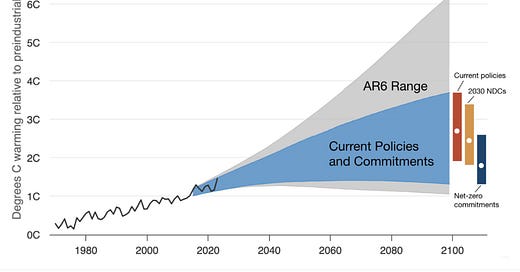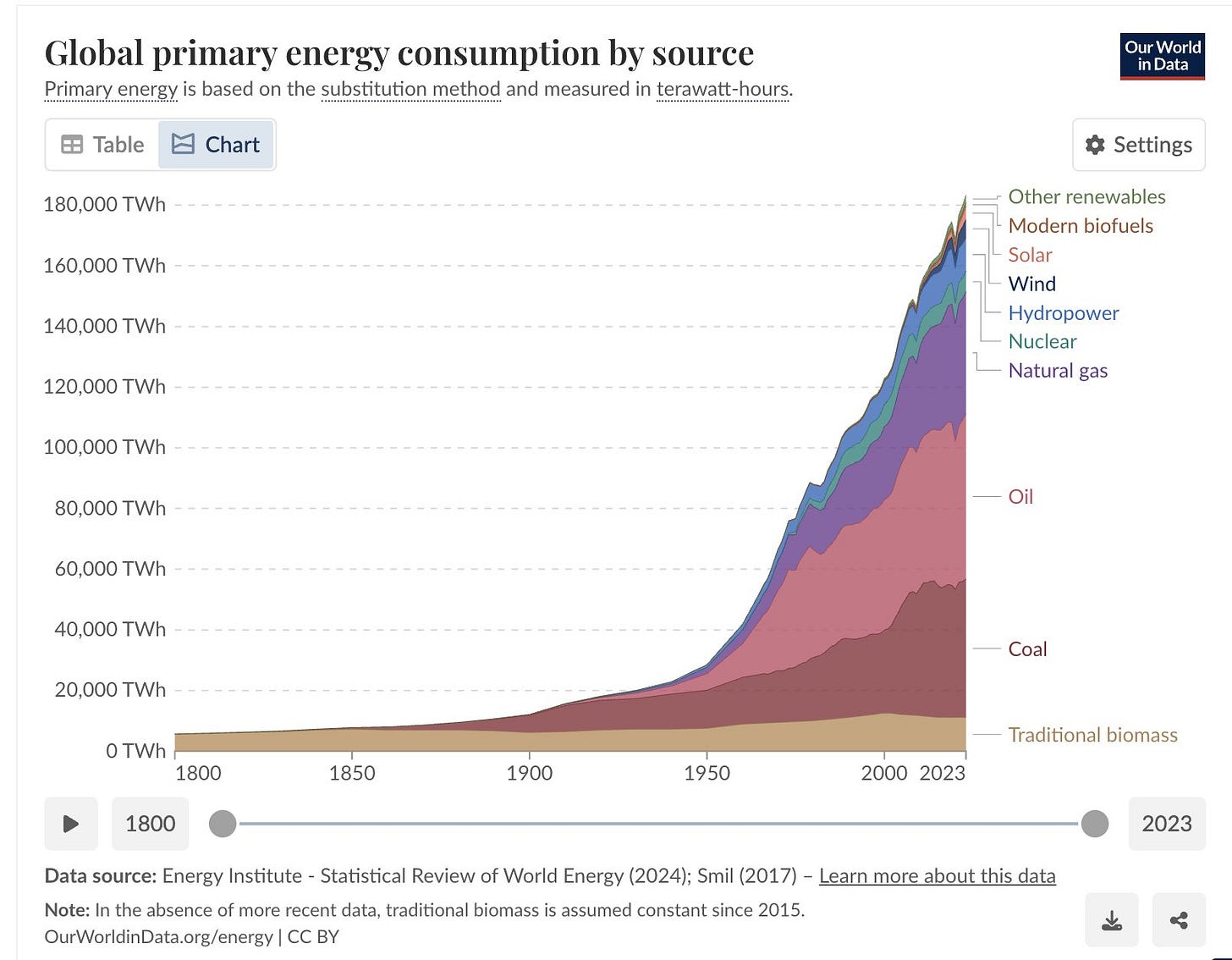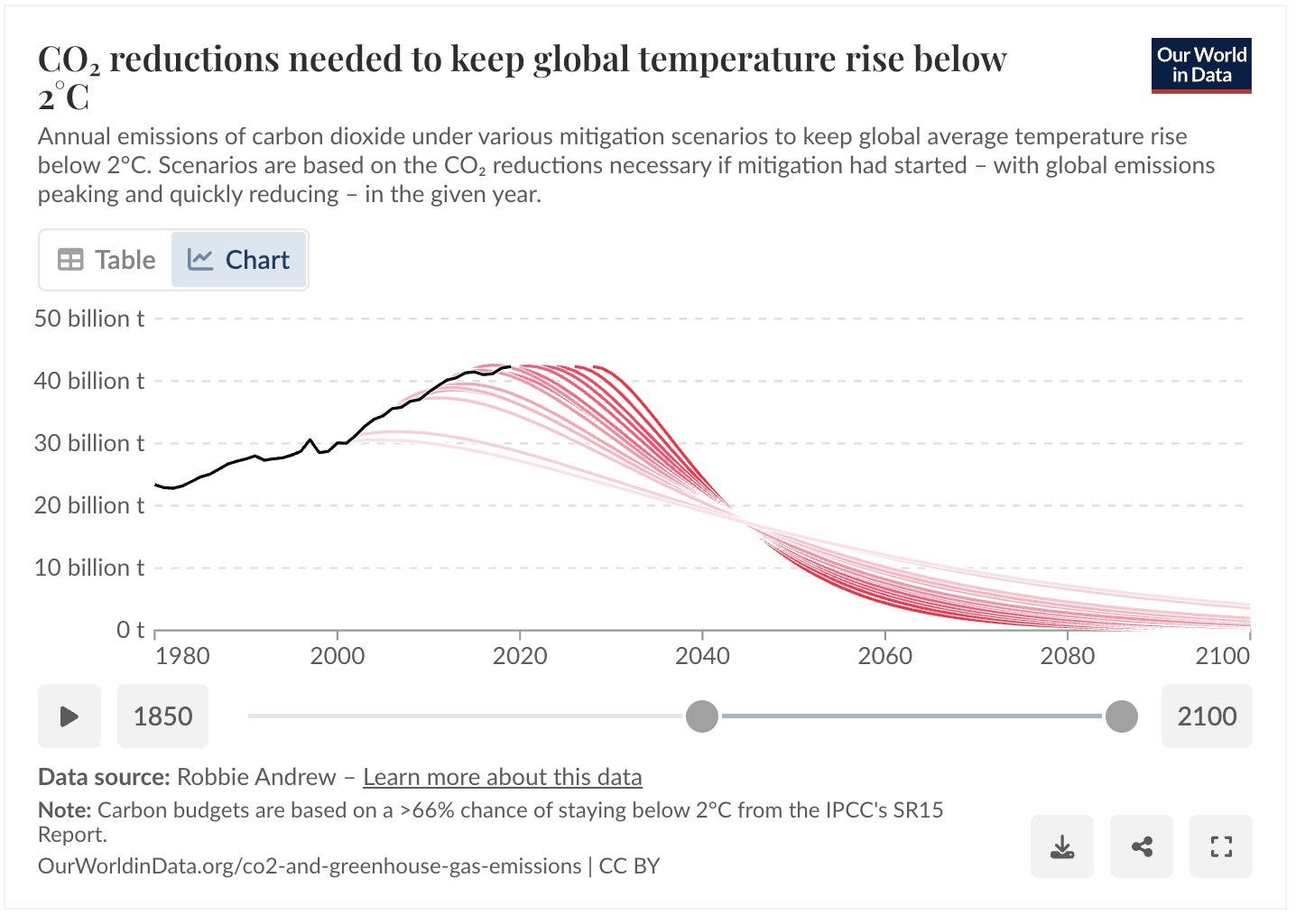1. The Small Numbers Problem
We’re heading for +2.7 degrees of warming by the end of this Century… The atmospheric concentration of CO2 has increased to 0.04%. These numbers SOUND small and unconcerning to most people. In reality, these are absolutely *MASSIVE* changes for Earth over such a relatively short period. Unfortunately, the smallness of these numbers does not convey the scale of change that has occurred, or the dangers involved.
2. The Domestic-International Responsibility Problem
At the national level, policymakers say their country contributes only a small share to climate change, so their actions won’t make a difference. Yet at the international level, action can only be genuinely enforced through nation-states. This leads to a sort of ‘Tragedy of the Commons’ where individual nations are disincentivized to embark upon ambitious climate action on their own, unless the bulk of the international community does too (and internationally there is no structure to enforce such action).
3. The False Sense of Safety Problem
When people hear about heat waves and extreme weather elsewhere, they feel relief that it's not an issue for them personally... Yet this potentially gives a false sense of safety, as it's only a matter of time before an extreme weather event comes for them. Climate change is going to affect just about every part of the world (albeit to differing extents) - but nowhere is really exempt from change.
4. The ‘NIMBY’ Problem
Transition towards climate-resilient development will require infrastructural development, increased density, and materials extraction; and yet, many people simply just don't want a new metro station, a high rise apartment, a wind turbine, or a mine in their community or backyard.
5. The Disinformation-Misinformation Problem
The fossil fuel sector has been casting doubt and skepticism about climate science for decades. They've spent enormous sums on this. Yet the result is an incredible amount of climate misinformation out there, stymying action. Judging from social media and a certain American political figure, this problem only seems to be getting worse.
6. The Energy Transition Scale and Growth Problem
Biomass was dominant for eons, then coal was dominant for a century, and then oil - which is still dominant, but poised to be replaced by natural gas. The problem is in NET terms we just ADD more energy each time there is a transition from one form of energy dominance to another (for instance, global coal use in 2024 was at an all-time record high for humanity!)
7. The Time-Horizon Problem
All the talk of adverse *future* effects from climate change is not very compelling for many. Climate change is seen as a problem for the next generation to deal with (even though we're already seeing damages today). In reality we are starting to see more and more the effects of climate change in our daily lives. And yet it still is framed as a future issue.
8. The Delayed Action - Steeper Reduction Curve Problem
The more we delay action, the more difficult the problem becomes. This is not just with respect to emissions reduction curves (which get steeper as we fail to act), but with regards to warming too (i.e. the more CO2 we would have to remove from the atmosphere in order to bring temperatures back down to - say - 2C of warming).
9. The Behavioural Change Problem
People don't really want to change their way of life or cultural practices or daily habits, but realistically *some* behavioural changes will be required (in transport practices, diet, production methods, investment and construction norms, etc.). Of course, some of these changes are easier to make than others; but changes which go against someone’s culture or identity are often not made voluntarily.
10. The Competing Problems Problem
There are many pressing challenges today in this world of ‘Polycrisis’. Some folks are just trying to get by, afford groceries and pay the rent. In some places people are dealing with warfare or insecurity. Understandably, climate change just is not the top concern for many in this world of problems. In a world of increasing income inequality, climate change is made worse (in fact, a recent study in Canada shows how provinces with a greater concentration of wealth amongst the richest 10% have higher GHG emissions).
11. The Benefits Distraction Problem
There are some ways that a warmer, higher CO2 world creates specific benefits (less deaths from cold exposure; some higher crop yields). Of course, the damages and risk outweigh these, but with misinformation - many see climate as “beneficial”. I can’t tell you how many times I’ve heard people say climate change is ‘good’ because less people are dying from cold exposure (a myopic argument if there ever was one).
12. The Profit Motive Problem
In a capitalist system, the reward-incentive structure is oriented towards profit maximization. There are cases where transition is indeed profitable (renewable energy tends to be cheaper, energy efficiency results in savings, etc.). But in most cases (today at least), the fossil fuel status quo is most profitable in the short term. Profiteering investors and bankers have shown time and time again their willingness to cast aside social and ecological objectives when profit is on the line.







Brilliant, Ryan. This is spot-on. Nicely summarized in accessible language, and deals bluntly with misinformation (I’d like to see just a bit more about misinformation but that can be the topic of another post). And how 'bout solutions?